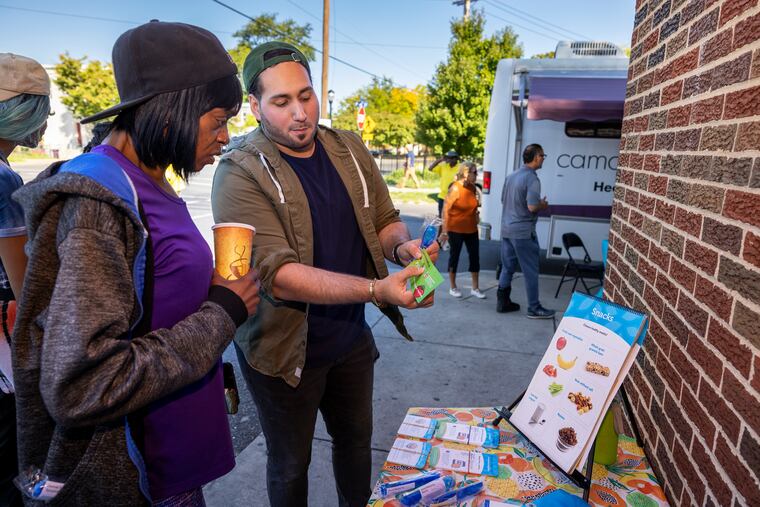Meeting people where they’re at: Corner stores become mini health centers
The Food Trust’s Healthy Corner Store Initiative combines training, equipment and support for store owners, and incentives for shoppers.

By the time Kameron Harmon drove up, he had only 15 minutes to get his quick nutrition lesson, grab his giveaway, and use his coupon for healthy food at the 700 Pine Street Store in Camden.
For almost 10 years, The Food Trust’s Healthy Corner Store Initiative (HCSI) and Heart Smarts Program have been working to transform corner stores, often disparaged as a nutritional wastelands, into community health hubs by combining training, equipment and marketing materials for owners with regular nutrition education and incentives for shoppers. Almost 3,400 participants took the nutrition lessons between August 2021 and June 2022.
“The real important thing is it is real in-person interactions,” explained Edgardo Bones, HCSI project manager. “We meet them regularly where they are at and start to develop relationship with people. That’s important, too, because it elevates the conversation.”
Many of the shoppers who came to the store, such as Harmon, were familiar with The Food Trust (TFT) bilingual community educators’ Jose Placencia and Ruth Perez’s Heart Smart lessons — a nine-week nutrition education series covering topics relevant to the corner store environment.
Harmon happened upon the lesson on snacks.
After Placencia’s rapid-fire talk — extolling the benefits of fruits and vegetables, granola bars, unsalted nuts and raisins over chips, cakes and cookies — Harmon dashed into the store. Placencia said the length and speed of the lesson varies with the time each person has. Placencia also adjusts the lesson to reflect what’s currently in stock. So even though the snack lesson called for people to buy carrots and celery sticks, 700 Pine Street Store had only grapes that day.
“We just vibe with the people.”
With his $5 Heart Bucks coupon, Harmon was able to get a mid-day snack of Ensure, a banana, milk and a small single serving package of cold cereal. “You have to eat healthy to be healthy. I want to live long,” 33-year-old Harmon said.
Almost $16,000 worth of coupons were redeemed last year in New Jersey at 30 corner stores, 28 of which are in Camden; the two others are in Trenton.
Yes, the cereal was Apple Jacks and, yes, Harmon faltered before the cakes and muffins before moving on, but for Placencia it was another win in the war of better eating. A war that is being fought on the parking lots of corner stores throughout the city of Camden — one person at a time.
“You have to eat healthy to be healthy. I want to live long.”
The United States has racked up a $3.5 trillion health care bill but ranks last in access to health care, administrative efficiency, equity and health care outcomes, according to the Commonwealth Fund.
A significant portion is attributed to diet-related chronic diseases such as diabetes, obesity and hypertension. According to research from the Centers for Disease Control and Prevention (CDC), 9 of 10 Americans consume too much sodium, half of adults drink at least one sugary drink a day, and less than one in 10 adolescents and adults manage to eat enough fruits or vegetables.
A 2021 study calculated that adults with obesity had $2,505 more in yearly health care costs than those who were of normal weight.
That’s why the Camden County Department of Health and Human Services joins TFT at five of the stores each month, providing health screenings and disease risk assessment services at its mobile van.
“The population appreciates when you come to them,” said Margarita Camacho, the public health nurse who oversees the outreach efforts. Camacho said that she was born and raised in Camden and speaks Spanish, which makes it easier for her to relate to the people she helps.
“We show them where they are in terms of their own health and [the lessons become] personal to them,” Camacho said.
The outreach nurses, dieticians and educators provide screenings and instruction that complement the Food Trust’s nutrition lessons. A high blood pressure reading would get a few words about the importance of a lower sodium diet, hence reinforcing Placencia’s suggestion to buy unsalted nuts.
“They check everything. It’s nice. They help people,” said Travis Jones, a cancer patient at Cooper University Hospital. Jones, who experienced a bout of homelessness before he came to Camden to live with a relative, was able to get a COVID vaccine and a blood pressure check, too. He used his coupon for a snack of bananas and orange juice.
“I live by Cooper Hospital, and I shop here and at the other Papi stores. I like to eat healthy,” said Shaquana Gibson, who stopped by with her mother, Andrea Hoagland, and stepfather, Clarence Hoagland, who has already suffered two strokes and was talking with the educator at the outreach van.
Showing photos of her once vigorous stepfather, Gibson said, “You have to eat right because you never know.”
Acknowledgment
The Philadelphia Inquirer is one of more than 20 news organizations producing Broke in Philly, a collaborative reporting project on solutions to poverty and the city’s push toward economic justice. See all of our reporting at brokeinphilly.org.